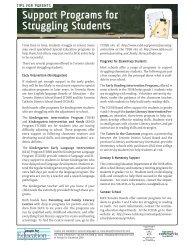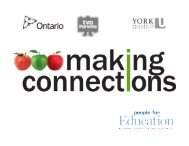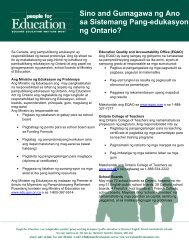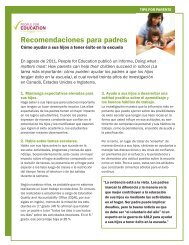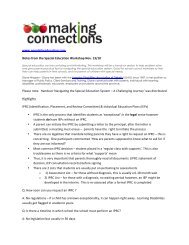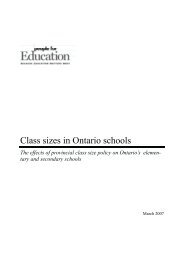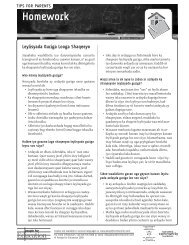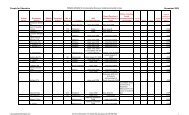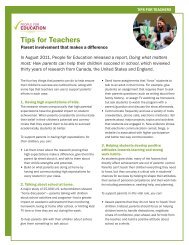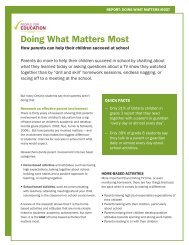Our Children Our Future Our Vision - People for Education
Our Children Our Future Our Vision - People for Education
Our Children Our Future Our Vision - People for Education
Create successful ePaper yourself
Turn your PDF publications into a flip-book with our unique Google optimized e-Paper software.
<strong>Our</strong> <strong>Children</strong>, <strong>Our</strong> <strong>Future</strong>, <strong>Our</strong> <strong>Vision</strong><br />
9. New Agenda Report on Written Submissions<br />
By Julia Candlish, COO <strong>Education</strong> Coordinator<br />
The New Agenda Working Group provided an opportunity <strong>for</strong> First Nation individuals and organizations<br />
to offer a written submission to outline issues, concerns and suggestions regarding First<br />
Nation education in Ontario. The Chiefs of Ontario website advised that written submissions would<br />
be accepted from all interested parties who wish to voice their concerns and express their ideas <strong>for</strong><br />
improving the reality of First Nations education in Ontario. This avenue of input received contributions<br />
from a representative cross-section of organizations in Ontario.<br />
<strong>Education</strong> funding is distributed by the federal government directly to First Nations and to various<br />
organizations with an interest in the provision of education. These organizations include Tribal<br />
Councils, Political Territorial Organizations (PTO) and various regional organizations. In most cases<br />
First Nation students will, at some point in their education, have to attend a provincially funded<br />
public school. There<strong>for</strong>e, the public school boards have a vested interest in advocating <strong>for</strong> comparable<br />
capability <strong>for</strong> First Nations education. Thus it is apt that the written submissions received as<br />
contributions to this report included a First Nation, a Tribal Council, a PTO, a First Nations regional<br />
organization, and a non-First Nations regional organization.<br />
This section provides a brief description of the authors of the written submissions and a consolidated summary<br />
of ideas, concerns and suggestions from the thoughtful written expressions of these organizations.<br />
1. Ontario Native <strong>Education</strong> Counsellors Association (ONECA)<br />
ONECA represents the administrative service arm of First Nation <strong>Education</strong> by supporting First<br />
Nation education counsellors whose role is to support First Nation students’ success and achievement<br />
through academic preparedness and personal motivation (self-esteem) and to advocate <strong>for</strong><br />
student services through a culturally supportive school environment.<br />
2. Association of Iroquois and Allied Indians (AIAI)<br />
AIAI currently represents eight (8) First Nations in Ontario with a membership of approximately<br />
20,000 people. The member Nations are geographically diverse, living in northern, eastern and<br />
southern Ontario. The tribal affiliations are equally diverse consisting of Mohawk, Potawatomi,<br />
Oneida, Mohawk, Ojibway and Delaware. Despite the diversity, AIAI is a non-profit organization<br />
which advocates <strong>for</strong> the political interests, such as education, <strong>for</strong> the eight member Nations.<br />
3. Ontario Public School Boards Association (OPSBA)<br />
The Ontario Public School Boards’ Association (OPSBA) represents public district school boards<br />
and public school authorities across Ontario. Together the members of OPSBA serve the education-<br />
Chiefs of Ontario<br />
76



